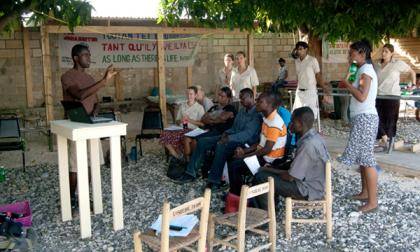
In interviewing Haitian women about breastfeeding habits this summer, Duke undergraduate Lauren Zalla at first relied heavily on her translator.
But those conversations became easier as Zalla's comprehension of Creole took hold. By summer's end, she was picking up on subtleties she would have missed had she not studied the language for two semesters prior to her study abroad experience in Haiti.
"As I got used to the accents I could talk to women one on one," Zalla says now. "It really helped me develop a rapport."
Score one for Duke's fledgling Creole language program, a key cog in efforts to make Duke a go-to place for Haiti scholarship. Created in 2009, the Creole course gained steam early last year when Duke faculty members created a much-publicized quickie version of it for medical personnel heading to Haiti following the devastating earthquake there.
The program has since gained a foothold. Starting this semester, Creole satisfies Duke's foreign language requirement. Eventually, faculty in Romance Studies, where the course is based, would like to see it become a core piece of the Romance Studies curriculum and perhaps integrated into a Caribbean Studies concentration.
At Duke, faculty say a strong focus on Haiti is important because the island nation, while small, is a global crossroads. Just two hours off the coast of Florida, the nation of 10 million has roots and influences in Africa, Europe and the Caribbean. There's work to be done there and, with it, opportunity. The rebuilding effort following last year's earthquake promises to continue for years. But even before that disaster, Haiti provided students and recent graduates with opportunities to work on development projects and with non-governmental organizations -- or NGOs.
"College graduates who have completed three courses in Creole will have unusual advantages," says Deborah Jenson, director of undergraduate studies in the Romance Studies department. "In the U.S., government and health care organizations in many cities need employees who can speak with increasingly large Haitian communities. Undergraduates with expertise in Haitian language and culture have many opportunities for graduate study, and successful doctoral students have prospects for academic employment in a variety of departments."
DukeEngage began a Haiti program in 2008, prior to the start of the Creole courses. Those early DukeEngage students had no language training and thus missed out on a full experience, says Kathy Walmer, who directs the program and also runs Family Health Ministries, an NGO in Haiti.
With the language training, students now get a totally different view of Haiti, Walmer says.
"If you can talk to an individual one-on-one, it makes the experience far more authentic," she says. "If you filter it, you'll miss the nuances."
Creole courses are taught by linguist Jacques Pierre, who came to Duke last year from Florida International University. The language program is one part of Duke's larger investment in the study of Haiti. It all centers on the Haiti Lab, the first humanities laboratory within the Franklin Humanities Institute that opened in Smith Warehouse in 2010.
The lab is an interdisciplinary workspace where faculty and students work on culture, history, language, law, art and technology. It is co-directed by Jenson, who has Romance Studies and Global Health appointments, and Laurent Dubois, who has appointments in Romance Studies and history.
Within higher education, choices are limited for students who want to study Creole -- and Haiti. There are around a dozen universities that offer the language. In 2009, just 135 students across the nation were enrolled in Creole courses, according to data from the Modern Language Association.
There is no newer data yet, and the earthquake may have led to a spike in interest.

Duke's advantage is the collaborative nature of the Haiti lab, which pulls students in from all sorts of majors, from African and African-American Studies to Global Health to French. Zalla, the student whose Haiti trip this summer got better as her Creole improved, is studying cultural anthropology.
"Duke is a leader in the study of Haiti," Jenson says. "No other university offers advanced study of Haitian literature and history in close association with its language program, at undergraduate and graduate levels."
The lab has helped raised Duke's Haiti profile. It didn't hurt that history doctoral student Julia Gaffield went off to London in 2010, rooted through the British National Archives and unearthed the only original copy of Haiti's Declaration of Independence. Gaffield's discovery -- she would later discover a second -- shed even more light on Duke's Haiti efforts.
And the earthquake itself helped focus attention on the fact that few American universities had expertise in the nation's language, culture and politics.
Duke officials think the humanities lab and the burgeoning Creole program is a sign of its commitment to Haiti scholarship.
"Events and disasters tend to shine a light on Haiti," said Dubois, one of the lab's co-directors. "But we're trying to do something more sustained."